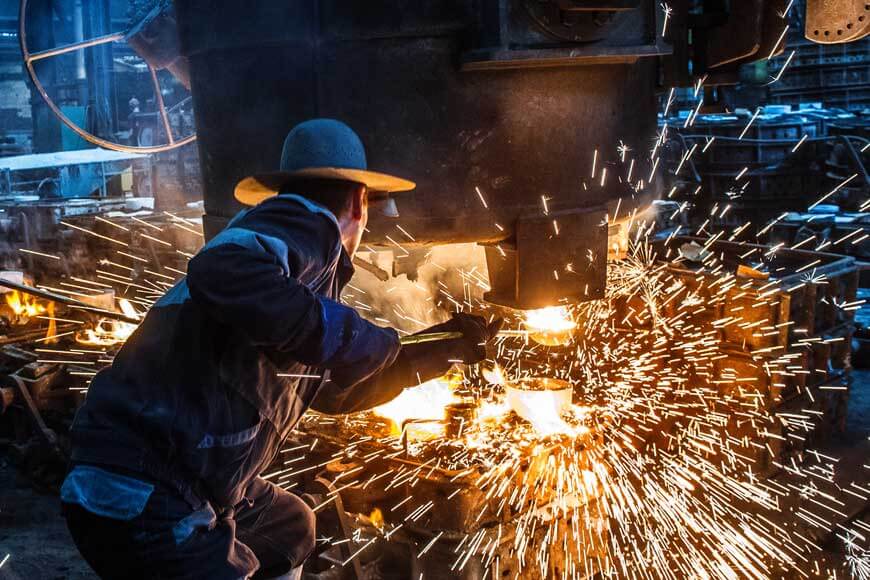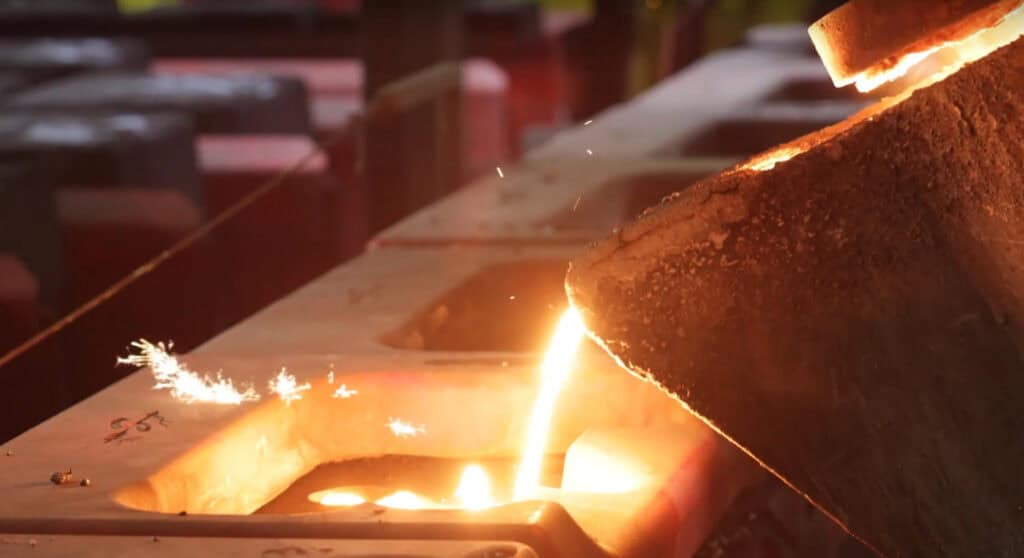Exactly How a Metal Foundry Adds to Lasting Metal Manufacturing Practices
Metal foundries play a vital duty in advertising sustainability within the metal manufacturing industry. By integrating recycled products, they lower reliance on virgin resources and minimize ecological influences. Energy-efficient melting procedures further reduce energy usage and exhausts. Nonetheless, the trip toward sustainable methods entails greater than simply reusing and power management. It includes a wider dedication to moral sourcing and cutting-edge modern technologies. The ramifications of these techniques are significant and warrant more detailed exam.
The Function of Recycling in Metal Foundries
While metal manufacturing has actually commonly depended on virgin products, the boosting emphasis on sustainability has actually led to a significant change in techniques, especially in metal foundries. Recycling has actually become a necessary part of this change, allowing foundries to repurpose scrap metal and reduce dependence on extracted resources. By integrating recycled products into their procedures, foundries not only lower ecological influence yet additionally lower production costs.
The usage of recycled steels, such as aluminum, steel, and copper, decreases power intake and minimizes greenhouse gas emissions connected with conventional mining and refining methods. In addition, foundries can accomplish premium outputs by using sophisticated sorting and processing modern technologies to ensure the pureness of recycled materials. This emphasis on reusing fosters a circular economic climate, where waste is minimized, and sources are utilized effectively. Metal foundries play a pivotal function in advertising sustainable methods within the metal production sector.
Energy-Efficient Melting Methods
Energy-efficient melting methods are essential for boosting sustainability in metal production. These strategies substantially lower energy usage throughout the melting procedure, which is one of the most energy-intensive stages in metal production. Technologies such as induction melting, resistance home heating, and microwave melting offer enhanced effectiveness contrasted to traditional methods. Induction melting, for example, utilizes electro-magnetic fields to produce heat directly within the metal, reducing energy loss and supplying accurate temperature level control.
In addition, implementing warm recovery systems can further boost performance by reusing and catching waste warm generated during melting. Utilizing sophisticated insulation materials and enhancing heating system styles also add to energy savings. By adopting these innovative melting techniques, metal foundries can lower their carbon impact, lower operational costs, and add to a much more lasting manufacturing landscape. The integration of energy-efficient practices not only straightens with ecological objectives however likewise fulfills the growing need for liable production approaches in the metal industry.
Sustainable Sourcing of Raw Materials
Sustainable sourcing of resources is vital for lessening the environmental impact of metal production. This entails the enhanced utilization of recycled metals, the adoption of ethical mining practices, and campaigns targeted at local sourcing. By focusing on these methods, the market can promote liable source management and assistance regional economic climates.

Recycled Metal Use
How can sectors efficiently reduce their environmental influence while satisfying the expanding need for metal? One considerable strategy is the usage of recycled metal. By including scrap metal into their manufacturing processes, foundries can reduce the removal of virgin materials, consequently conserving all-natural sources and minimizing energy usage. Recycled steels call for much less energy to procedure compared to their raw counterparts, bring about reduced greenhouse gas emissions. Furthermore, the usage of recycled metal aids draw away waste from land fills, promoting a circular economic climate. Industries that focus on recycled metal not just add to sustainability but also benefit from expense financial savings associated with reduced material procurement. Recycled metal usage stands as a necessary method for eco liable metal manufacturing.
Moral Mining Practices
While the need for metals remains to climb, markets are increasingly acknowledging the importance of ethical mining methods in making certain accountable sourcing of basic materials. Moral mining incorporates a commitment to environmental stewardship, social duty, and adherence to reasonable labor practices. Firms are currently prioritizing collaborations with mines that show openness in their procedures, decreasing ecological impact and valuing neighborhood areas. This technique not only promotes a sustainable supply chain however also boosts the online reputation of businesses entailed. By carrying out rigorous requirements and certifications, sectors can deal with unlawful mining tasks and advertise the welfare of employees. Eventually, honest mining practices add markedly to a much more sustainable metal manufacturing environment, aligning financial growth with ecological and social integrity.
Local Sourcing Campaigns

Technologies in Metal Casting Processes
Advancements in metal casting procedures are changing the industry by incorporating innovative recycling methods that lessen waste. Energy-efficient melting methods are also being created to reduce power intake during manufacturing. Additionally, making use of innovative mold and mildew materials adds to boosted performance and sustainability in casting operations.
Advanced Recycling Techniques
Advanced recycling methods are transforming metal casting procedures, substantially improving sustainability in the industry. These innovations concentrate on recycling and reclaiming scrap metal, considerably lowering waste and the requirement for virgin materials. Strategies such as hydrometallurgy and pyrometallurgy enable foundries to remove useful steels from utilized elements, guaranteeing reliable resource application. Furthermore, progressed sorting and purification modern technologies enhance the top quality of recycled steels, making them suitable for high-performance applications. This not only minimizes the environmental impact of metal company website production yet also promotes a circular economic situation by advertising the reuse of materials. As these reusing techniques continue to develop, they guarantee to additionally simplify operations within foundries and add to a much more lasting metal manufacturing landscape.
Energy-Efficient Melting Methods
While standard melting approaches have actually long been the foundation of metal casting, recent improvements have presented energy-efficient strategies that significantly lower energy consumption and exhausts. Technologies such as induction melting and electric arc heating systems have actually obtained prestige, enabling accurate control over temperature level and lowering the need for fossil fuels. These techniques not Metal Casting just boost power efficiency however likewise advertise much faster melting times, which converts to decrease operational expenses. Furthermore, advancements in warmth healing systems allow foundries to catch and reuse excess warm produced during the melting procedure. This alternative technique to power administration not just supports lasting methods however also settings metal foundries as leaders in the shift towards greener production processes, better aligning with global sustainability objectives.
Innovative Mold Products
As the demand for more effective and sustainable metal casting procedures grows, the exploration of ingenious mold materials has actually come to be a centerpiece in the sector. Typical mold and mildew materials commonly contribute to environmental difficulties, motivating the look for options that lower waste and power intake. Recent developments consist of the growth of naturally degradable binders and recyclable composites, which not only boost mold and mildew performance but also decrease environmental impact. In addition, making use of 3D printing technology in mold and mildew development allows for complex designs that reduce material use and allow rapid prototyping. These ingenious materials not just enhance casting precision but also straighten with sustainability goals, showcasing the market's commitment to lowering its carbon footprint while keeping high-grade production criteria.
Reducing Waste With Advanced Technology
Innovative innovations are transforming the metal production market by considerably minimizing waste and enhancing effectiveness. Advanced data analytics and artificial intelligence algorithms allow foundries to enhance manufacturing procedures, recognizing inadequacies and minimizing scrap material. Smart sensors keep an eye on devices performance in real-time, permitting predictive maintenance click for info that reduces downtime and waste generation. Additionally, additive production strategies, such as 3D printing, allow for the creation of complex components with marginal product use, substantially lowering waste contrasted to conventional techniques.
In addition, closed-loop systems are coming to be extra widespread, where scrap metal and byproducts are reused back right into the production cycle, ensuring that products are used to their maximum potential - Aluminum Foundry. This integration of modern technology not only advertises resource conservation however also improves the overall sustainability of metal production practices. By welcoming these developments, foundries can add to an extra lasting future while keeping competitiveness in the market
The Impact of Foundries on Carbon Impact Reduction
Foundries play a necessary duty in lowering the carbon impact of the metal production sector by applying various sustainable practices. By using energy-efficient technologies, such as electric arc heaters, these centers considerably reduced greenhouse gas exhausts contrasted to standard methods. Furthermore, foundries increasingly take on sustainable power sources, which likewise reduces their dependence on fossil fuels.
Recycling scrap metal is an additional vital technique that foundries use, conserving resources and lowering the need for virgin materials. This not just minimizes waste but likewise minimizes the energy-intensive removal procedures related to mining. Moreover, the adoption of closed-loop water systems assists to decrease water use and reduce wastewater discharge, adding to an extra lasting procedure.
With these campaigns, foundries show their dedication to ecological stewardship, leading to a marked reduction in the overall carbon footprint of the metal production sector. Their ongoing initiatives are crucial in the change towards a much more lasting industrial landscape.
Often Asked Concerns
What Sorts of Metals Are Many Frequently Recycled in Foundries?
Aluminum, copper, brass, and steel are amongst the most typically recycled metals in foundries. These metals are favored due to their high recycling rates, financial worth, and widespread accessibility, contributing significantly to industrial sustainability efforts.
Just How Do Foundries Make Certain the High Quality of Recycled Materials?
Foundries ascertain the top quality of recycled materials via strenuous testing, sorting, and filtration procedures. They execute advanced innovations to examine composition and remove pollutants, guaranteeing that the recycled steels satisfy sector criteria for performance and safety.
What Qualifications Exist for Sustainable Foundry Practices?
Numerous accreditations exist for sustainable foundry techniques, including ISO 14001 for ecological management, ISO 50001 for power administration, and LEED accreditation for sustainable structure methods (Aluminum Foundry). These accreditations assist guarantee adherence to ecological and sustainability criteria in operations
Just How Do Foundries Measure Their Carbon Impact Decrease?
Foundries determine carbon footprint reduction with tools like lifecycle evaluations, power audits, and emissions tracking systems. They contrast standard emissions to present results, assessing improvements in power effectiveness, product use, and sustainable power adoption in time.
What Are the Economic Advantages of Lasting Metal Production?
Sustainable metal manufacturing supplies economic benefits such as minimized operational expenses, raised efficiency, enhanced market competitiveness, and prospective federal government motivations. Additionally, it fosters development and draws in eco aware customers, ultimately driving long-term success for services.
Metal foundries play a vital function in advertising sustainability within the metal manufacturing market. While metal production has commonly relied on virgin materials, the increasing emphasis on sustainability has led to a substantial change in techniques, especially in metal foundries. By including scrap metal right into their manufacturing processes, foundries can decrease the extraction of virgin materials, therefore minimizing and preserving all-natural sources power usage. Foundries play a crucial duty in lowering the carbon impact of the metal manufacturing market by implementing various sustainable techniques. Reusing scrap metal is an additional essential technique that foundries utilize, saving resources and lowering the requirement for virgin materials.